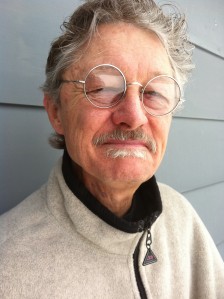 Having sold thousands of copies of his young adult novel, A Boy Called Duct Tape, author Ron Hutchison talks about his latest young adult novel, Voices of the Locusts and his favorite part of the book and his struggles on the road to publication.
Having sold thousands of copies of his young adult novel, A Boy Called Duct Tape, author Ron Hutchison talks about his latest young adult novel, Voices of the Locusts and his favorite part of the book and his struggles on the road to publication.
About Voices of the Locusts
Sixteen-year old Jack O’Brien has never known the bittersweet stint of love, and romance is the farthest thing from his mind as he and his family arrives at a remote U.S. Air Force outpost in Japan where Jack’s father is base commander. The year is 1948. Jack’s life changes after a chance encounter with Fujiko Kobaysi, a beautiful and enchanting 17-year-old Japanese girl. Jack is immediately smitten.
Fujiko’s traditional parents are overly protective and monitor her every move, and Jack and Fujiko meet secretly at her garden, located some distance from her village. There is a good reason why Fujiko’s parents are so protective and Jack is devastated when Fujiko tells him that her parents have promised her in marriage to an older man, a practice common throughout Asia at the time. The marriage is only a months away. Jack devises a cunning plan, one that will overshadow her arranged marriage and bring Fujiko and him together.
Playing against a backdrop of swirling post-War social change, Voices of the Locusts tells the story of three families – one black, one white, one Asian. Told in Jack’s voice in vivid and sometimes haunting detail, Jack and Fujiko are frustrated in their romantic quest by story characters coming to terms (often violently) with the emotional scars of World War II.
Voices of the Locusts Excerpt
A flutter of panic races through my body. It is instantly replaced by a sweep of joy, and a strange, unnatural lucidity overcomes me.
Fujiko and I hesitate for what seems a small eternity, our eyes locked in a moment of mutual understanding. Finally, I lean in toward Fujiko and she leans in toward me. Our eyes close and our mouths touch in a whisper-soft kiss, a brief, gentle brush of lips.
I pull back slowly, my heart racing, my head alive with all manner of strange, warm images. This must all be a dream. A wonderful, glorious dream. I don’t want to ever wake up.
Interview
Will you share with us how you came up with the idea for this book?
I attended high school in Japan for two years when my father was stationed at an Air Force base in a remote part of the main island of Honshu. My father would often take me duck hunting, a service offered by a local fisherman who would ferry us about in search of ducks. After each hunt, my father would loan his shotgun to the Japanese fisherman, allowing the man to hunt for ducks himself. The Japanese man was poor and had a family, and the shotgun helped provide food for the fisherman’s family. The man was more than pleased by my father’s generosity, but by loaning the weapon, my father put his military career at great risk.
You see, my father’s kindness was in violation of Occupation Law, which prohibited Japanese citizens from owning or using firearms. (Occupation Law was enacted following World War II.) The loaning of the shotgun was the seed of the idea for my novel, and much of the story is based on my personal experiencing while living and attending school in Japan. And yes, there was a real fisherman who took us on real duck hunts in his rickety, diesel-powered fishing boat; I was 14 at the time, and recall the hunts in detail.
Do you plan your stories first with an outline or does it come to you as write it?
I tried outlines, but they simply didn’t work for me. I give a story a great amount of thought before sitting down to write it. I generally know the beginning, the middle, and the end of my story in advance of laying down the first chapter. I piece it together in my head before sitting at my laptop and banging out the story.
Do you know the end of the story at the beginning?
Yes, with one exception—my second novel “Latitude 38.” I had no idea how the novel would end, even as I was drawing close to the conclusion of the story. I rewrote the ending several times before settling on an ending I was comfortable with. I knew in advance how my other three novels would end.
Do you have a process for developing your characters?
Years ago, I read a short book titled “Characters Make Your Story.” The book served as a guidepost for me and I pay close attention to every character in my novels. Painting a picture of a character, for me, carries great weight. For the reader to visualize the character, a writer must pay close attention to every aspect of the character: his physical makeup: his attire, his speech; his habits, both good and bad, his likes and dislikes, etc. I paint my characters with a broad brush, and there is no mistaking the protagonist or the antagonist. Most of my characters are so-called “composite characters.” They are a mix of personality traits, both real and imagined.
It is said that authors write themselves into their characters. Is there any part of you in your characters and what they would be?
I would agree with this statement. I identify closely with Jack O’Brien in “Voices of the Locusts.” He is a young idealist struggling to please his father. I, too, was a young idealist (still am, the truth be told) and struggled in my early teen years to please my father.
What is your most favorite part about this book?
When Jack O’Brien first kisses Fujiko Kobaysi.
What struggles have you had on the road to being published?
My first two books traveled the traditional road. My next two were self-published. My third novel, a middle-grade story titled “A Boy Called Duct Tape,” was soundly rejected by many publishers, thus my decision to severe my relationship with my literary agent, and strike out on my own. Published in the spring of 2012, it took about six months for the novel to gain traction, but since December of 2012, I have sold more than 1,000 copies of the novel at Amazon. That’s small potatoes for a Doubleday, but large potatoes for me.
What has been the best part about being published?
The royalties. Amazon takes a small percentage, but the balance is deposited directly into my bank account by Amazon. It’s a clean business model.
What do you want readers to remember and carry with them after reading your novel?
I’d like the reader to feel his or her $4.99 was money well spent.
Do you have plans to write another book?
I have written first drafts on three more—two middle grade and one YA—and my adult novel “The Redhead, the Bookie, and the G-Man” is completed and will be posted at Amazon in about two months.
About Ron Hutchison
 Ron Hutchison began writing fiction full time after a long career in journalism and public relations. Voices of the Locusts is his fourth novel. A multi-genre author, Hutchison’s choice of novels to write is determined not by genre, but by the weight of the story. Hutchison graduated from the University of Missouri in 1967 with a degree in journalism. He has worked as a reporter, editor, and columnist at newspapers in Texas, California, and Missouri. He was employed by a Fortune 100 company as a public relations executive, and later operated his own public relations agency. Hutchison attended high school in Japan, and much of his Voices of the Locusts is based on personal experience. Hutchison lives in Joplin, Missouri.
Ron Hutchison began writing fiction full time after a long career in journalism and public relations. Voices of the Locusts is his fourth novel. A multi-genre author, Hutchison’s choice of novels to write is determined not by genre, but by the weight of the story. Hutchison graduated from the University of Missouri in 1967 with a degree in journalism. He has worked as a reporter, editor, and columnist at newspapers in Texas, California, and Missouri. He was employed by a Fortune 100 company as a public relations executive, and later operated his own public relations agency. Hutchison attended high school in Japan, and much of his Voices of the Locusts is based on personal experience. Hutchison lives in Joplin, Missouri.

